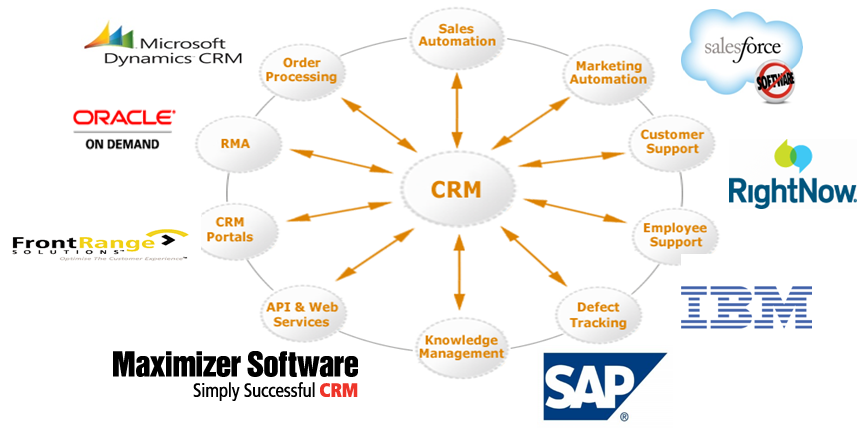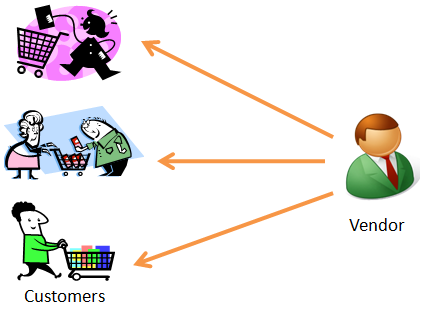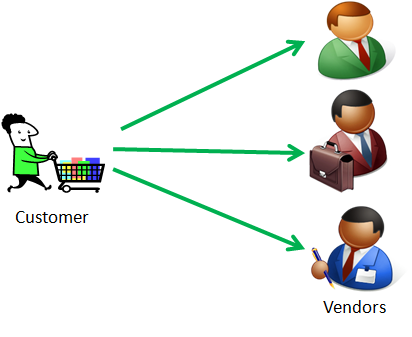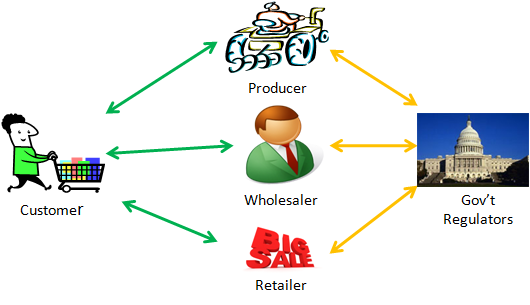I ended Part I stating that industry had been essentially leaving the customer out of the equation, too. What I meant was that enterprise class systems like the Customer Relationship Management (CRM) Systems offered by so many companies ...

... are a significant part of the problem.
Customer Relationship Management is about companies trying to manage their prospect and customer relationships.  CRM systems contribute (or, maybe I should say, reinforce) one-up/one-down information sharing in supply chains and ipso facto the Bullwhip Effect. And Michael Hinshaw makes the point that even though billions have been spent on CRM over the last 15 years ($9+ billion in 2008 alone), overall customer satisfaction has remained flat. To the right is a simpler version of CRM.
CRM systems contribute (or, maybe I should say, reinforce) one-up/one-down information sharing in supply chains and ipso facto the Bullwhip Effect. And Michael Hinshaw makes the point that even though billions have been spent on CRM over the last 15 years ($9+ billion in 2008 alone), overall customer satisfaction has remained flat. To the right is a simpler version of CRM.
The flip-side to CRM is envisioned to be Vendor Relationship Management (VRM). VRM would provide to people – individuals who recognize their value as customers, and wish to better define the terms of their relationships – the software, tools and ability to manage their vendor relationships, as well as their interactions and experiences.
 To the left is a simple picture of VRM in which a consumer is able to conveniently manage multiple vendor relationships. The critical thought leadership for VRM is found with Doc Searls and the VRM Project at Harvard's Berkman Center but VRM in the marketplace still largely remains a vision.
To the left is a simple picture of VRM in which a consumer is able to conveniently manage multiple vendor relationships. The critical thought leadership for VRM is found with Doc Searls and the VRM Project at Harvard's Berkman Center but VRM in the marketplace still largely remains a vision.
Picking back up from Part I on the concept of viewing food safety regulators as a kind of consumer, and mashing together VRM (from the perspective of customers) with a whole chain traceability system for supply chains (from the perspective of food safety regulators) it would more or less have to look like this:

"OK," you say, "that's a nice, neat, REALLY simple picture but isn't this already happening on Facebook? Can't the Customer, Producer, Wholesaler, Retailer, and even the Government Regulators all become Facebook friends and experience right now this mashed-together vision of VRM and whole chain traceability? And isn't this what Social CRM is all about?"
No, no and ... no.
 The challenge is not one of fixing the latest privacy control issue that Facebook presents to us. Nor is the challenge fixed with an application programming interface for integrating Salesforce.com with Facebook. The challenge is in providing the software, tools and functionalities for the discovery in real-time of proprietary supply chain data that can save people's lives and, concurrently, in attracting the input of exponentially more valuable information by consumers about their personal experiences with food products (or products in general, for that matter). Supply chain VRM (SCVRM)? Whole chain VRM (WCVRM)? Traceability VRM (TVRM)? Whatever we end up calling it, we know we will be on the right track when we see a flattening out of the Bullwhip Effect, won't we?
The challenge is not one of fixing the latest privacy control issue that Facebook presents to us. Nor is the challenge fixed with an application programming interface for integrating Salesforce.com with Facebook. The challenge is in providing the software, tools and functionalities for the discovery in real-time of proprietary supply chain data that can save people's lives and, concurrently, in attracting the input of exponentially more valuable information by consumers about their personal experiences with food products (or products in general, for that matter). Supply chain VRM (SCVRM)? Whole chain VRM (WCVRM)? Traceability VRM (TVRM)? Whatever we end up calling it, we know we will be on the right track when we see a flattening out of the Bullwhip Effect, won't we?
On the one hand, Facebook is highly relevant to this discussion because (a) it has over 500 million users, many of them businesses and government agencies, and (b) because it has helped to raise the expectations of its users regarding the availability of - and their hunger (no pun intended) for - real-time information. On the other hand, we are a long way from seeing headlines that read "Facebook immediately identifies and confirms source of salmonella contaminated peppers" or "Facebook tracks food ingredients in dioxin scare" or "Facebookers receive real-time e. coli food recall notices based on their hamburger actual purchases".* For that to happen, we need a few more ingredients added to the mix and one of them is the metadata ...

... by which each of the participants may be empowered to keep the degree of control over their data that will free it up for real-time access (and analysis) by others. Yes, it's ironic. Give more control to consumers so as to get more, better quality data from them about their experiences with food products? Makes perfect sense to Doc Searls and the VRM folks. They get that VRM is the ironic reflection of CRM.
The other ingredients? I'll finish up with those in the next - and final - journal entry. But I will say that I'll be returning to those interesting comments made by Walmart's Frank Yiannas .....
Continued in a final Part III.
_________
* Actually, for an example of an implementation that is technically achievable right now, see my earlier blog Consortium seeks to holistically address food recalls. Substitute in "Facebook" for "Food Recall Bank".